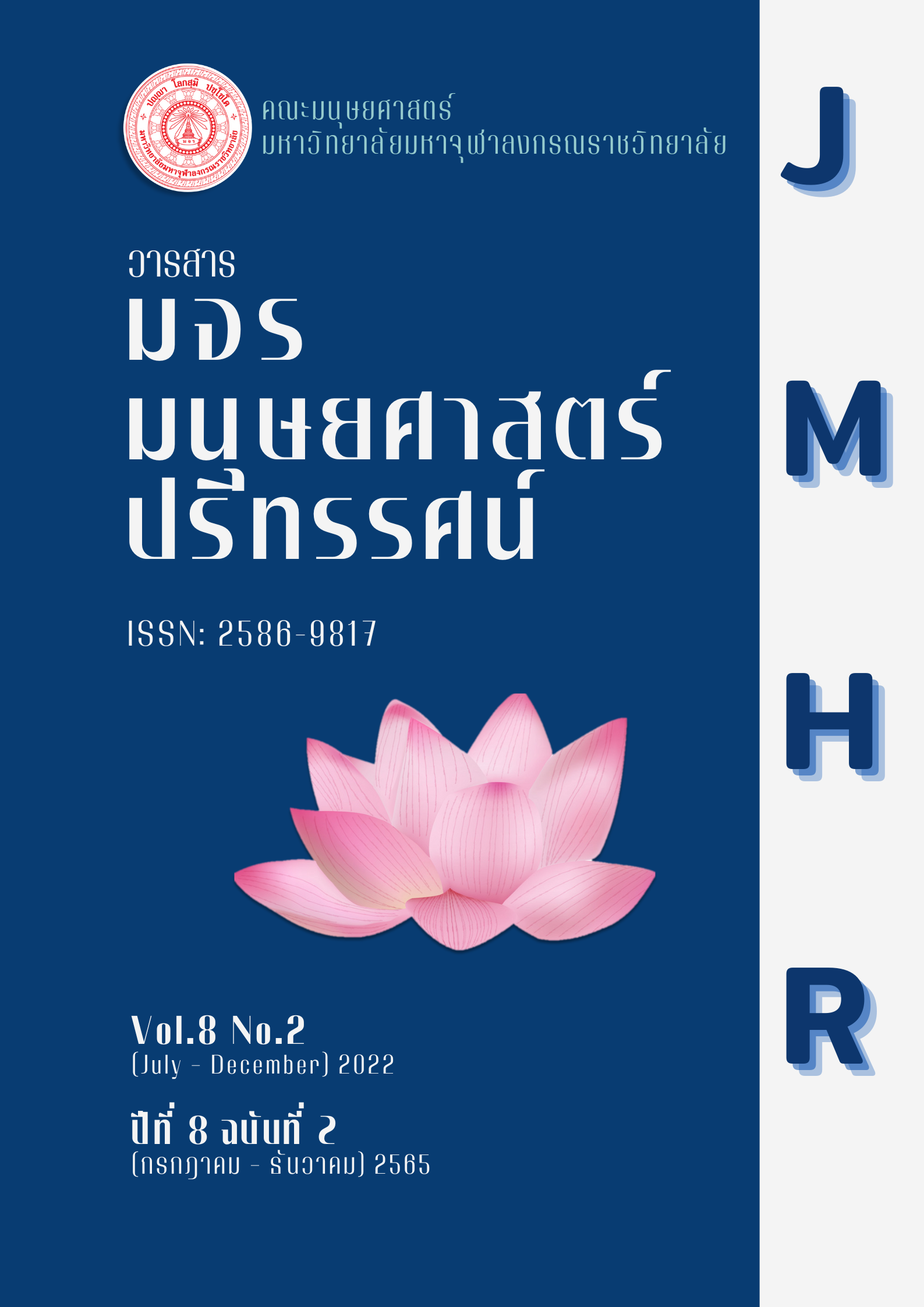ภาวะผู้นำของผู้บริหารโรงเรียนมัธยมศึกษาตามหลักพุทธธรรม ในยุค New Normal
คำสำคัญ:
ภาวะผู้นำ, ผู้บริหารโรงเรียนมัธยมศึกษาบทคัดย่อ
พระพุทธศาสนามีหลักธรรมที่เหมาะสมสำหรับนำมาประยุกต์กับการพัฒนาตนเองของผู้บริหารโรงเรียนมัธยมศึกษามากมาย หากการนำหลักธรรมทางพระพุทธศาสนามาประยุกต์ใช้กับการบริหารสถานศึกษาแล้วทำให้เกิดผลดีหลายประการส่งผลให้เกิดความสุขทั้งปัจจุบันและอนาคตทั้งแก่ผู้บริหารเอง และเพื่อนร่วมสายงานหรือผู้ใต้บังคับบัญชาทุกคน เกิดความไว้วางใจเป็นที่ยอมรับซึ่งจะส่งผลให้การบริหารงานในสถานศึกษาของผู้บริหารโรงเรียนประสบความสำเร็จ ดังนั้นผู้เขียนจึงสนใจศึกษาหลักพุทธธรรม ที่จะสามารถนำมาประยุกต์ใช้กับผู้บริหารโรงเรียนมัธยมศึกษา จึงเป็นสิ่งสำคัญยิ่งสำหรับผู้บริหารโรงเรียนมัธยมศึกษาในการที่จะบริหารจัดการสถานศึกษา และเป็นปัจจัยขับเคลื่อนในการนำพาสถานศึกษา ครูและบุคลากรที่เกี่ยวข้องไปสู่การพัฒนาเพื่อให้บรรลุผลตามเป้าหมาย ผู้บริหารโรงเรียนสามารถนำหลักพุทธธรรมประยุกต์ใช้ในการบริหารสถานศึกษา ในยุค New Normal คือ หลักทุติยปาปณิกธธรม ประกอบด้วย 1) จักขุมา คือ ความชำนาญในการใช้ความคิดหรือทักษะทางด้านความคิด 2) วิธูโร คือ ความชำนาญการด้านเทคนิคหรือทักษะทางด้านการปฏิบัติงาน และ 3) นิสสยสัมปันโน คือ ความชำนาญด้านมนุษยสัมพันธ์หรือทักษะทางด้านมนุษย์สัมพันธ์ และหลักไตรสิกขา ประกอบด้วย ศีล สมาธิ และปัญญา อีกทั้งมีบทบาทสำคัญที่จะต้องบริหารจัดการทรัพยากรทางการศึกษาให้เกิดประสิทธิภาพ และความสมดุลเพื่อให้บริหารจัดการศึกษาบรรลุผลสำเร็จ และต้องมีคุณสมบัติคุณลักษณะเป็นที่เคารพศรัทธาเป็นบุคคลที่มีคุณธรรม จริยธรรมเป็นที่ยอมรับของสังคม และใช้ระบบคุณธรรมในการบริหารจัดการ นอกจากนี้ ผู้บริหารสถานศึกษาควรเลือกหลักธรรมที่เหมาะสมและส่งผลต่อสมรรถนะที่สำคัญและจำเป็นของผู้บริหาร การปฏิบัติงานของครู และบุคลากรทางการศึกษาได้อย่างมีประสิทธิภาพและเกิดประสิทธิผลสูงสุด
เอกสารอ้างอิง
กรองกาญจน์.พฤฒิพฤกษ์. (2556). อิทธิบาท 4 ของผู้บริหารและพนักงานที่มีผลต่อความสำเร็จในการดำเนินกิจการ กรณีศึกษา : บริษัท สตาร์มาร์คแมนูแฟคเชอร์ริ่งจำกัด จังหวัดสมุทรสาคร. การประชุมหาดใหญ่วิชาการ ครั้งที่ 4.
กระทรวงศึกษาธิการ. (2563) .คู่มือการปฏิบัติสำหรับสถานศึกษาในการปองกันการแพรระบาดของโรคโควิด 19. นนทบุรี: บริษัท คิว แอดเวอรไทซิ่ง จำกัด.
กระทรวงศึกษาธิการ. (2564). แนวทางการจัดการเรียนการสอนในสถานการณ์การแพร่ระบาดของโรคติดเชื้อไวรัสโคโรนา 2019 (COVID-19) ภาคเรียนที่ 1 ปีการศึกษา 2564. พฤษภาคม, 2564. กรุงเทพธุรกิจ. (2565). "New Normal" คืออะไร? เมื่อโควิด-19 ผลักเราสู่ชีวิต "ปกติวิถีใหม่". สืบค้น 5 มิถุนายน 2565, จาก https://www.bangkokbiznews.com/lifestyle /882508
ถวิล อรัญเวศ. (2565). การให้วิทยาทานคือการให้สูงสุด. ค้นเมื่อ 1 มิถุนายน 2565, จาก http://thawin09.blogspot.com/2017/02/blog-post_12.html
ธนาคารแห่งประเทศไทย. (2563). รายงานภาวะเศรษฐกิจไทย ปี 2563. กรุงเทพฯ : ธนาคารแห่งประเทศไทย.
ธีระ รุญเจริญ . (2546). การบริหารโรงเรียนยุคปฏิรูปการศึกษา. กรุงเทพฯ : ข้าวฟ่าง.
บริษัทฝึกอบรมและสัมมนาธรรมนิติจำกัด. (2565). เกร็ดความรู้กับธรรมนิติ : บริหารคนด้วยพรหมวิหาร 4. สืบค้น 1 มิถุนายน 2565. จาก บริหารคนด้วยพรหมวิหาร 4: https://www.dst.co.th/
พระครูไพโรจน์กิจจาทร.(สกุล สุภทฺโท) และคณะ. (2563). การพัฒนาผู้บริหารสถานศึกษาตามหลักสังคหวัตถุ 4 สำหรับโรงเรียนประถมศึกษา สังกัดกรุงเทพมหานคร. วารสารครุศาสตร์ปริทรรศน์ฯ, 7(2), 1-13.
พระธรรมโกศาจารย์ (พุทธทาสภิกขุ). (2562). วิธีแก้ปัญหาชีวิต. กรุงเทพฯ : สำนักพิมพ์แสงธรรม, ม.ม.ป.
พระธีระพงษ์ นรินฺโทและคณะ. (2562). คุณค่าการปกครองแบบธรรมาธิปไตยตามนัยพุทธจริยศาสตร์, วารสารบัณฑิตศึกษามหาจุฬาขอนแก่น. 6(4), 47-60.
พระมหาธนาชัย ตนฺติปาโล. (2560). พุทธธรรมสำหรับนักบริหารสถานศึกษามืออาชีพ, วารสารวิจัยพุทธศาสตร์, 3(1), 10-22.
วิโรจน์ สารรัตนะ. (2556). กระบวนทัศน์ใหม่ทางการศึกษา กรณีทัศนะต่อการศึกษาศตวรรษที่ 21. กรุงเทพฯ : ทิพยวิสุทธิ.
สมเด็จพระพุทธโฆษาจารย์ (ป.อ.ปยุตฺโต). (2542). พุทธธรรม (พิมพ์ครั้งที่ 8). กรุงเทพฯ : โรงพิมพ์มหาจุฬาลงกรณราชวิทยาลัย.
สำนักงานพัฒนาธุรกรรมทางอิเล็กทรอนิกส์. (2565). e-Commerce ไทย ยุคหลัง COVID-19. สืบค้น 6 มิถุนายน 2565 จาก https://www.etda.or.th/th/Useful-Resource/Knowledge-Sharing/Perspective-on-Future-of-e-Commerce.aspx
สำนักงานราชบัณฑิตยสภา. (2563). พจนานุกรมศัพท์นิเทศศาสตร์ ฉบับราชบัณฑิตสภา. กรุงเทพฯ : สำนักงานราชบัณฑิตยสภา.
สุวิมล โพธิ์กลิ่น. (2560). การบริหารสถานศึกษายุคใหม่ที่มีประสิทธิผล. อุบลราชธานี: ยงสวัสดิ์อินเตอร์กรุ๊ป.

ดาวน์โหลด
เผยแพร่แล้ว
รูปแบบการอ้างอิง
ฉบับ
ประเภทบทความ
หมวดหมู่
สัญญาอนุญาต
ลิขสิทธิ์ (c) 2022 วารสาร มจร มนุษยศาสตร์ปริทรรศน์

อนุญาตภายใต้เงื่อนไข Creative Commons Attribution-NonCommercial-NoDerivatives 4.0 International License.





